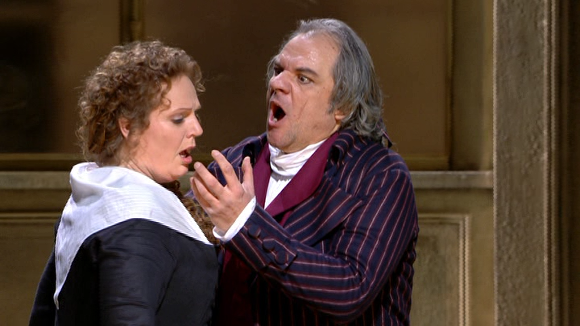What’s become of David McVicar? His 2015 production of Giodarno’s Andrea Chénier for the Royal Opera House seems typical of his recent work. It looks expensive. It features a starry cast. He flirts with dramatic risk but in the last analysis it comes off as a bit tame and even sloppy. Basically when the principals are at the centre of the drama it’s compelling stuff but when they are not it’s not and there are curious inconsistencies.

Let’s look at a few things that exasperated me or seemed evidence of sloppiness. First, the minor characters and the chorus just don’t seem to have got much direction. There’s a lot of stock opera acting and the chorus looks amateurish. There’s a scene, for example, where a tumbril of the condemned are supposed to be being pelted with vegetables but it looks like they are giving catching practice to a class of eleven year olds. When one thinks of the precision with which a Carsen or a Bieito uses the chorus this is just unacceptable. Then there’s the costuming. They make a big deal of the costumes being period authentic down to the undergarments and the way they fasten but in Act 1 (set in 1789) we have ballet dancers in pointe shoes! Then there’s the prostitutes in Act 2 rather demurely (for tarts) flashing their garters. Fifteen years ago McVicar would have had them flashing something else. There are, however, no giant axes.

The timidity and lack of focus is a shame because the principals are dramatically very good indeed. Jonas Kaufmann plays Chénier and he just dominates the stage whenever he’s on. I need hardly add that he sings magnificently. Željko Lučić as Carlo Gérard is every bit as good in both departments. He’s particularly fine in his self denouncing aria in Act 3. Eva-Maria Westbroek as Maddelena di Coigny is also fantastic. Her duets with Lučić in Act 3 and Kaufmann in Act 4 are extremely compelling. Denyce Graves, as Bersi, has less to do but what she does is very fine. The minor characters and chorus sing well enough but they don’t always seem to understand why they are there! No complaints about conducting or orchestra though. I think Antonio Pappano is at his best in red blooded Italian melodrama and that’s what this is.

Video direction is by Jonathan Haswell and I did think about whether he uses too many close-ups but for once I think it’s justified. The gold here is all in the principals so why not showcase them? The picture on DVD is fine. Almost all the scenes are well lit so perhaps not so much need for extra precision of Blu-ray, which is an option. The DTS-HD sound is nicely three dimensional and a certain loss of immediacy is apparent when using the PCM stereo track instead. There are about fifteen minutes of extra material dealing with musical issues and costuming. They are well worth a look before watching the main event. The booklet includes a biographical essay on Giodarno and a synopsis but no track listing. Subtitle options are English, French, Italian, German and Spanish.

Despite my reservations about the production I think this disk is worth a look. The performances by the principals are exceptionally compelling and Pappano in this kind of rep is not to be missed.


Pingback: Distorted mirrors | operaramblings